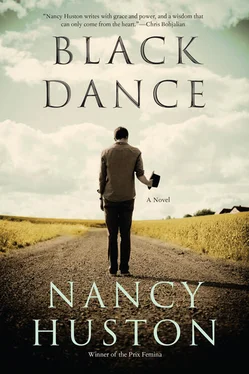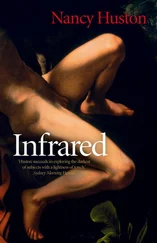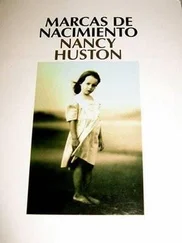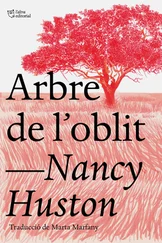Milo stares at her coldly. Her eyes drop to the ground.
Several such trajectories. Back. Forth. Back. Forth. One day, as he’s burying yet another statuette behind the house, he sees Jacob Bernstein, shoes in hand, climbing out of Marie-Thérèse’s bedroom window. The man heads for the road, tiptoeing absurdly through the high grasses in his sock feet and glancing about to make sure no one is watching him. His hunchback somehow makes his stealthiness even more ridiculous. CUT.
OVER THE COURSE of the next few years, Milo, you would piece together the implausible tale of your aunt’s love life. Long ago, at age sixteen, she’d gone to Quebec City to try to make a life for herself. She’d been hired as a servant by the writer and recluse Jacob Bernstein and the two of them had fallen head over heels in love. Horrified, Marie-Thérèse’s mother, Marie-Jeanne, had put her foot down. Are you out of your mind? A man twice your age? A hunchback ? A Jew ? You can’t be serious!
Eventually, reluctantly, the girl had obeyed her mother’s order to come home. She was devastated. Far from healing, her heartbreak had festered within her, making her tense, miserable and pragmatic. The following year, she had married Régis Dubé, the only one of her local suitors whose marriage proposal had included a diamond ring. They’d taken over the property and started a family together. And then, a mere few months after the wedding, Jacob Bernstein had bought a house in the area and the love affair had resumed. It had thrived — before, after and even during Marie-Thérèse’s pregnancies. With a rare gift for secrecy, the lovers had now been carrying on for nigh on thirty years.
Though you resented your aunt, Milo, you also respected her — for knowing about love.
• • • • •
Neil, 1918
ON ITS WAY to Liverpool, Neil’s ferryboat passes another, crossing the Irish channel in the opposite direction. On that boat, though he has no way of knowing it, disguised as a Red Cross nurse, is the formerly fiery, now aged and gaunt Maud Gonne.
She’d attempted to come back to Dublin back in February but had been promptly arrested, along with seventy-odd other nationalists including Countess Constance Markiewicz, and deported to England. Nine harrowing months at Holloway Prison have done considerable damage to Gonne’s health. She is emaciated and chastised, her splendid red hair has grayed — but today at last, after so many long years of exile, frustration and furor, Maud is coming home to Ireland! Her plan, naturally, is to head straight for her beloved apartment on Saint Stephen’s Green — loaned free of charge during her absence to her wonderful old friend, the poet William Butler Yeats. She has no way of knowing that Willie’s young wife, Georgie, is currently pregnant with their first child, and that Willie will refuse the returned exile entrance to her own home, for fear that she might infect the mother-to-be with cholera, curiosity, or politics. An unhappy ending indeed to the thirty-year friendship between gentleman poet and lady politician.
Neil, using his father’s money and connections for what he hopes is the last time, has papers forged for himself in Liverpool.
“Neil Noirlac,” he tells the man who runs the clandestine printing press.
“A French name you want, is it? For living in French Canada?”
“That’s right. I simply took the name of my hometown and exaggerated it a bit. Dublin means dark pool in Gaelic, Noirlac means black lake in French.”
“I see. Sumpin’ as if we were to take Liverpool, swell it up and turn it into Cirrhoselac?”
Neil gratifies the man with a laugh.
“Do you not want to change your Christian name while you’re about it, so’s they fit together?”
“No, Neil Noirlac is fine. I like the alliteration.”
“The what’s that?”
“Never mind. Another way of fitting.”
“’Tis as you please. Speaking of fitting, you’ve heard the one about the two Irish fairies, haven’t you? Gerald Fitzpatrick and Patrick Fitzgerald?”
(Of course we’ll cut that, Milo. Sorry. Terrible taste.)
* * *
. . And now he is on the steamer.
For nine endless days and nights, in the near-darkness of his cramped cabin beneath the deck, as the late-November storms buffet it from Liverpool to Quebec City, Neil empties the contents of his stomach. He brings up Trinity College, Queen Elizabeth, Queen Victoria, King Edward VII, King George V and Archbishop Billy Walsh of Dublin. He pukes up Saint Stephen’s Green and the death of his cousin Thom. He rids himself of Daisy, Dorothy, his mother, his father, his former life, his former self and the very name Kerrigan —good word to say while vomiting — has a certain spitting-out quality to it.
YOU WANT THIS sequence to make us claustrophobic, Milo. Come to think of it, Neil must have accepted at least one more favor from his father. Who but that powerful magistrate could have secured him passage on this steamer from Liverpool to Quebec City. . or from Southampton to Montreal?
You don’t know much about this time in your grandfather’s life, Astuto, but it doesn’t much matter; the main thing is to have the camera show him, in his cramped quarters on the ship, sitting on the trunk that contains all his belongings, including the invaluable signed copies of Dubliners and The Wind Among the Reeds , and puking his guts up for three minutes straight. We don’t need to actually see or hear him doing this; we can guess at it from the heaves and tremors of his body. Meanwhile, in voice-over, we’ll hear him telling you the tale of his crossing thirty-five years later. .
ARMISTICE HAD BEEN signed a mere fortnight ago, and I’d managed to hitch a ride, as it were, on one of the first vessels bringing Canadian soldiers home. The troops were seriously thinned out: as they will teach you someday in school, Canada had left sixty-two thousand of her young men in the soil at Ypres and Verdun! As for my shipmates the survivors — exhausted, wounded, mutilated, mad — they were mere stumps of their former selves. But I wasn’t thinking about the soldiers, Milo. I was vomiting.
Though I grew up in the Bay of Dublin facing the sea, I’d never set foot on a real boat before. The Irish, you see, unlike the British, French, Spanish, Portuguese, or Italians, are not seafarers. Over the centuries, the ocean has generally brought them bad news in the form of conquerors and marauders, so they prefer to turn their backs to it. Apart from digging up cockles and mussels along its edges, they have not tended to think of it as a source of amusement, discovery, or food. This is why, unbelievable as it may seem, when the Irish potato crop was wiped out by mildew in the mid-1840s, it did not occur to them to eat fish and a million of them starved to death. But I was not thinking of the potato famine as I crossed the Atlantic, Milo, I was too busy vomiting.
For more than a century already, Ireland had been degurgitating its own population. Puking up the poor. Heaving up the destitute. Splattering its ill and hopeless, ragged and starving masses all over the planet. Oh, Milo, the misery of my country is beyond belief! In a single century, that tiny island spewed eight million desperate human beings off its surface. How could there be any left? you might ask, and a good question it would be! The answer can be summed up in a single word: Catholicism.
Big families. Personally, I’d always suffered from having only one sibling, and an unpleasant one at that. I envied the James Joyces of the world, who grew up in the rough-and-tumble company of a large family. Ten young’uns there were in the Joyce clan — ten who survived, that is — of a dozen born! Only later did it occur to me that my mum must have had everything removed after Dorothy’s birth: in those days, Catholic families with only two children were unheard of.
Читать дальше












